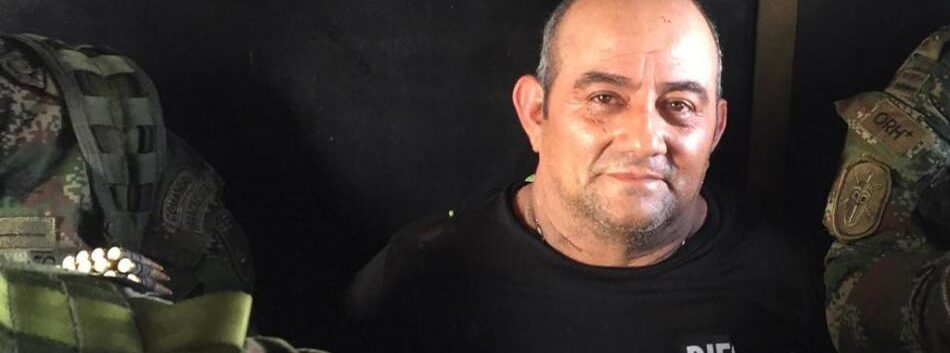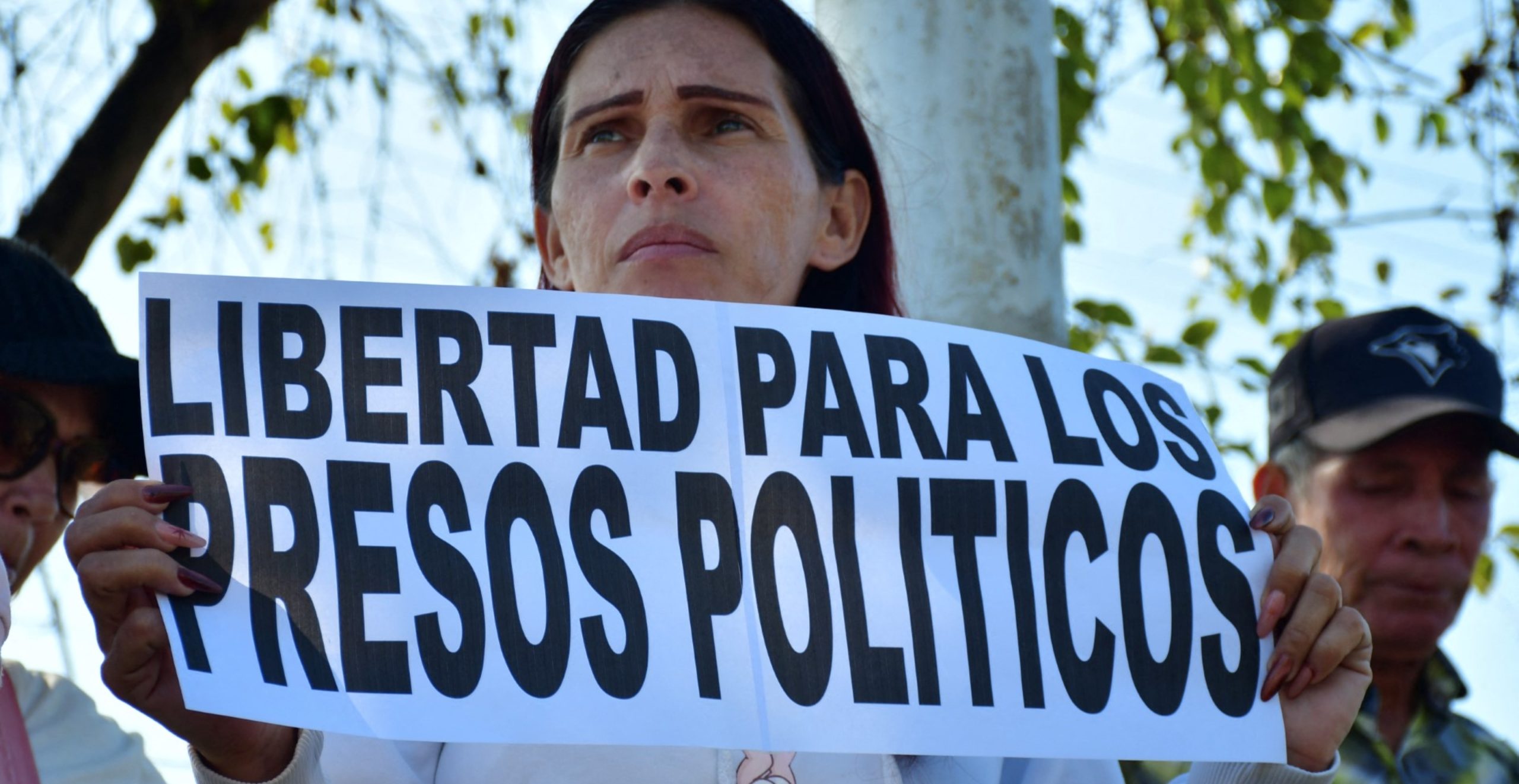International
Colombia’s most-wanted drug lord ‘Otoniel’ captured

AFP
Colombia’s most-wanted drug trafficker “Otoniel” has been captured, officials said Saturday, a major victory for the government of the world’s top cocaine exporter.
Dairo Antonio Usuga, who headed the country’s largest narco-trafficking gang known as the Gulf Clan, was captured near one of his main outposts in Necocli, near the border with Panama.
Images released by the government showed the 50-year-old Otoniel in handcuffs and surrounded by soldiers.
“This is the hardest strike to drug trafficking in our country this century,” president Ivan Duque said in a message, adding that the arrest was “only comparable to the fall of Pablo Escobar,” the notorious Colombian narco-trafficking kingpin.
Some 500 soldiers backed by 22 helicopters were deployed in the Necocli municipality to carry out the operation, which left one police officer dead.
It was “the biggest penetration of the jungle ever seen in the military history of our country”, Duque said.
A live broadcast by the police later showed a handcuffed Otoniel landing in Bogota before being taken into custody under heavy security.
Colombia’s police chief Jorge Vargas said during a press conference that authorities carried out “an important satellite operation with agencies of the United States and the United Kingdom.”
According to police, Otoniel was hiding in the jungle in the Uraba region, where he is from, and did not use a telephone, relying on couriers to communicate.
Fearful of authorities, he “slept there in the rain, never approaching inhabited areas,” Vargas said.
The United States had offered a $5 million bounty for information leading to the arrest of Otoniel, one of the most feared men in Colombia.
He was indicted in the United States in 2009, and faces extradition proceedings to the country, where he would appear in the Southern District of New York federal court.
The Colombian government blames the group — financed mainly through drug trafficking, illegal mining and extortion — for being one of the main drivers of the worst bout of nationwide violence since the signing of a peace pact with FARC guerillas in 2016.
The Gulf Clan is present in almost 300 municipalities in the country, according to the independent think tank Indepaz. However, recent government efforts have seen the organization decimated.
– Life of violence –
Although Otoniel announced in 2017 he intended to reach an agreement to participate with the Colombian justice system, the government responded by deploying at least 1,000 soldiers to hunt him down.
He took over the leadership of the Gulf Clan — previously known as the Usuga Clan — from his brother Juan de Dios, who was killed by police in 2012.
Born to a poor family, Otoniel joined the Popular Liberation Army (EPL), a Marxist guerrilla group that demobilized in 1991.
After laying down his arms, he later returned to fighting, joining far-right paramilitary groups.
Many of these were demobilized in 2006 at the initiative of former right-wing president Alvaro Uribe’s administration, but Otoniel decided to remain in the fight.
Colombia is the world’s top producer of cocaine, with the United States as its principal market, despite half a century of efforts to clamp down on the drug trade.
In remote areas where there is little government presence, criminal groups like the Gulf Clan, dissident FARC guerrillas and leftist ELN rebels fight bloody turf battles to control drug trafficking corridors and illegal mining operations.
International
Spain’s irregular migrant population rises to 840,000, study finds

The number of migrants living in Spain without legal residency status continues to rise and has reached 840,000 people, with 91% originating from the Americas, particularly Colombia, Peru and Honduras, according to a report by the Spanish think tank Funcas (Foundation of the Savings Banks).
An estimated 17.2% of the non-EU foreign population living in Spain is in an irregular administrative situation. The estimate is based on the gap between the number of foreign residents effectively living in Spain, according to the National Statistics Institute (INE), and those who hold a residence permit, benefit from international protection, or are in the process of obtaining it.
The data, as of January 1, 2025, point to a notable and sustained increase in irregular migration since 2017, when the estimated figure stood at around 107,000 people, representing 4.2% of the non-EU population residing in Spain.
By origin, migrants from the American continent stand out, totaling around 760,000 people, or 91% of all irregular migrants. Colombians account for nearly 290,000, followed by Peruvians with almost 110,000, and Hondurans with about 90,000. Migrants from Africa (50,000), Asia (15,000) and Europe (14,000) trail far behind.
The figures predate Spain’s latest immigration regulation reform, which came into force in May 2025 and introduces measures to ease access to legal status through residency ties. According to Funcas, the reform would, in principle, tend to reduce the number of migrants in an irregular situation.
International
Historic snowstorm paralyzes Toronto after 60 centimeters of snow

Toronto, Canada’s largest city and the fourth most populous in North America, was largely paralyzed on Monday after a historic snowstorm dumped up to 60 centimeters of snow and sent temperatures plunging to -15 degrees Celsius, authorities said.
Late Sunday, as the scale of the snowfall became clear, city officials declared a climate emergency, triggering extraordinary measures including parking bans on several major streets to facilitate snow removal operations.
Toronto’s public transit authority reported that while some buses remain immobilized, subway and streetcar services are operating with relative normality, though localized disruptions may occur.
A similar situation is affecting the city’s commuter rail network, which remains operational but is experiencing significant delays on its main routes due to the severe weather conditions.
International
Venezuela frees at least 80 political prisoners, NGO says

At least 80 political prisoners were released on Sunday across Venezuela, human rights group Foro Penal reported, as the broader process of detainee releases continues at a slow pace under the interim government.
Foro Penal’s director, Alfredo Romero, wrote on social media platform X that verified releases took place nationwide and that the figure could rise as more confirmations are completed.
Attorney Gonzalo Himiob, also from Foro Penal, said the excarcelations occurred during the early hours of the day and emphasized that the number is not yet final pending further verification.
The releases are part of a series of steps announced by Venezuela’s interim leader, Delcy Rodríguez, who took power after the capture of former President Nicolás Maduro in a U.S. military operation on Jan. 3, 2026. Rodríguez has pledged a significant number of liberations but has been criticized by opposition groups and rights organizations for the slow and nontransparent nature of the process.
So far, the Venezuelan government reports that 626 detainees have been freed since December, though independent counts by human rights groups suggest the number of actual political prisoner releases is lower and that many remain behind bars.
Families of those still detained have maintained vigils outside prisons, hopeful for further releases even as broader concerns about political imprisonment and due process persist.
-

 Central America4 days ago
Central America4 days agoGuatemala’s president rules out negotiations with inmates after prison riots
-

 Internacionales4 days ago
Internacionales4 days agoMajor winter storm threatens “catastrophic” ice and snow across much of the U.S.
-

 International3 days ago
International3 days agoTrump-Era Defense Plan Prioritizes Border Security and Scales Back Global Commitments
-

 Central America23 hours ago
Central America23 hours agoGuatemala seizes over a ton of cocaine hidden in flour at Pacific port
-

 International3 days ago
International3 days agoBogotá and Quito Seek Dialogue After Tariffs and Power Cut Escalate Tensions
-

 International4 days ago
International4 days agoGuatemala considers sending high-risk gang members to military prisons
-

 International2 days ago
International2 days agoDelcy Rodríguez seeks political agreements after Maduro’s ouster
-

 International2 days ago
International2 days agoFederal immigration agents kill man in Minneapolis, sparking protests and outrage
-

 International4 days ago
International4 days agoRights group says over 5,000 killed in Iran protests, mostly civilians
-

 International23 hours ago
International23 hours agoHistoric snowstorm paralyzes Toronto after 60 centimeters of snow
-

 International23 hours ago
International23 hours agoSpain’s irregular migrant population rises to 840,000, study finds
-

 International23 hours ago
International23 hours agoRights group says nearly 6,000 killed in Iran protest crackdown
-

 International23 hours ago
International23 hours agoVenezuela frees at least 80 political prisoners, NGO says
-

 International23 hours ago
International23 hours agoEU launches new probe into X over AI-generated fake nude images
-

 International23 hours ago
International23 hours agoFrance debates ban on social media for children under 15
-

 International23 hours ago
International23 hours agoSevere winter storm grips U.S., leaves multiple dead as extreme cold persists


























